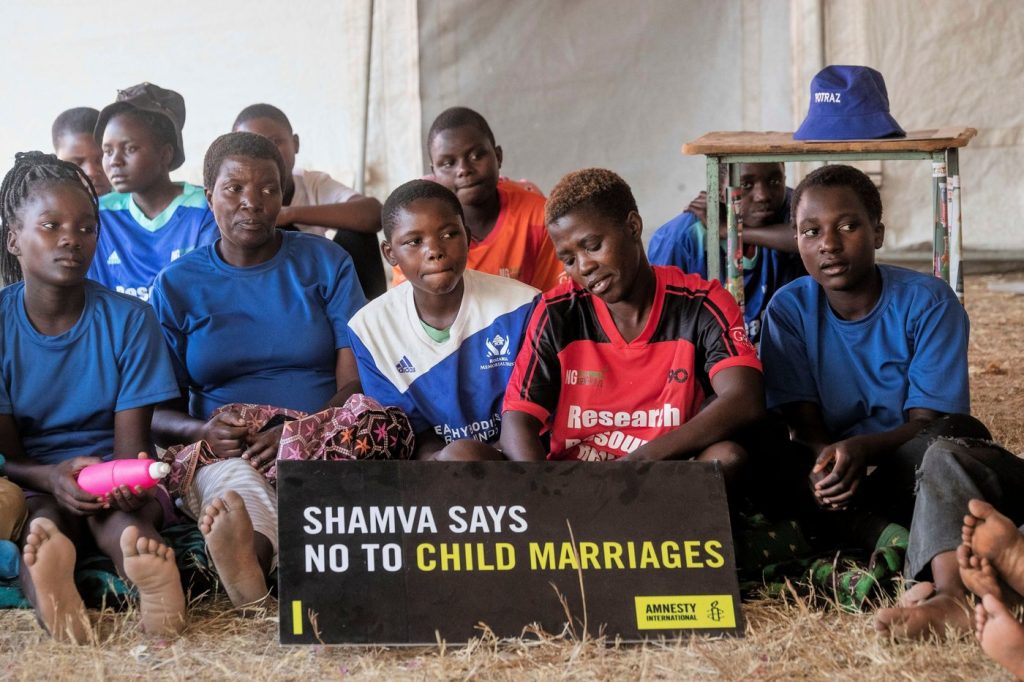SHAMVA, Zimbabwe (AP) – Inside a white tent in rural northeastern Zimbabwe, approximately two dozen African girls gathered to share their thoughts and experiences. This unique space, reminiscent of the traditional Nhanga, or "girls' bedroom," served as a platform for discussing sensitive issues such as sexuality, child marriage, teen pregnancy, gender bias, education, and economic empowerment. The atmosphere was welcoming, as the girls held hands and chanted, "It's so nice to be here," before diving into their discussions.
The revival of Nhanga marks a significant cultural shift, turning an old practice that traditionally prepared girls for marriage into a modern peer-led movement aimed at resisting child marriage, which is prevalent in Zimbabwe. The initiative allows the participants to carve out a safe space for self-expression and support. "This is a safe space; every girl feels free," stated 18-year-old Anita Razo, a mentor who joined the movement when she was just 14.
Traditionally, Nhanga was a female-only room where girls were indoctrinated into obedient roles, focusing on pleasing their future husbands and following patriarchal expectations. However, today's version of Nhanga serves as a forum for addressing contemporary issues and empowering girls. Nokutenda Magama, a program officer with the Rozaria Memorial Trust, emphasized that the modern Nhanga is a "cultural innovation dealing with modern problems," allowing girls to tackle subjects that remain sensitive in conservative households.
The sessions are not only focused on discussions but also include practical skills training in areas such as poultry farming, agriculture, and soap-making. The Rozaria Memorial Trust organizes these gatherings by age groups, ensuring that the curriculum is suitable for participants ranging from as young as five to women over 35, promoting mentorship across generations.
The urgency of the Nhanga revival is underscored by alarming statistics from the United Nations Children's Fund, which reports that one in three girls in Zimbabwe are married before the age of 18. The issue is widespread across East and Southern Africa, with child marriage rates exceeding 40% in parts of Central and West Africa, notably in Niger, where the figure surges to 76%, ranking the highest globally.
Despite Zimbabwe outlawing child marriage and initiating laws to support girls, cultural norms, poverty, and lax law enforcement continue to perpetuate the issue. Samantha Chidodo, a 26-year-old final-year law student, represents the journey of transformation possible through the Nhanga program. Chidodo was forced into an abusive marriage at the age of 17, but after escaping, she returned to school with support from Rozaria Memorial Trust and became a pioneer of the modern Nhanga.
Initially, Chidodo and her peers were a small group, but as they thrived, community support grew. "Almost 90% of us did well, with some going to college while others started projects," she noted. Today, more than 200 girls in her village actively participate, and the model has even spread to schools across Zimbabwe, with similar initiatives emerging in Zambia and Sierra Leone. The Nhanga's impact has reached the African Union and United Nations policy discussions.
To address the cultural roots of child marriage, the movement has sought the support of local chiefs and village leaders, who play a critical role in enforcing rules against early marriage. Village headman Xmas Savanhu explained that offenders are fined and required to fund the girl's education. This system allows young girls to continue their education without financial burdens while ensuring cultural leaders work with NGOs to aid young mothers in resuming their schooling.
However, challenges persist, particularly concerning poverty and deep-seated beliefs about discipline and punishment for young mothers. Enet Tini, a teacher and mentor, highlighted the disparity between government policies allowing girls to return to school after childbirth and parental reluctance to support these girls, framing early marriage and pregnancy as a moral failing.
Nyaradzai Gumbonzvanda, deputy executive director at UN Women and founder of the Rozaria Memorial Trust, called on communities to involve girls in the fight against child marriage, stating that changing social norms is vital to eradicate this global problem. "Laws are important, but it is critically essential to reach the girls themselves," she added.
As the discussion among the girls at Nhanga continues, young mentor Anita Razo encapsulated the sentiment: "If we can pressure each other into behaving badly, then we can also influence each other to act positively."











